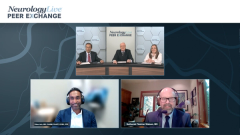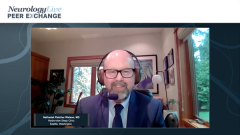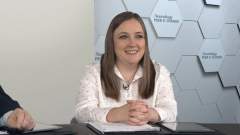
An Overview of Acute Vs Chronic Insomnia
Expert perspectives on how patients may present differently with acute vs chronic insomnia.
Episodes in this series

Transcript:
Michael J. Thorpy, MD: Hello, and welcome to this Neurology Live® Peer Exchange titled “Unmet Needs in Treating Insomnia.” I’m Dr Michael Thorpy, the director of the Sleep-Wake Disorders Center at Monefiore Medical Center and a professor of neurology at Albert Einstein College of Medicine in the Bronx, New York. Joining me in this discussion are my colleagues Dr Karl Doghramji, a professor of psychiatry, neurology, and medicine at Jefferson Medical College of Thomas Jefferson University in Philadelphia [Pennsylvania]; Dr Erinn Beagin, an internal medicine practitioner specializing in general practice and preventive care in Princeton, New Jersey; Dr Nathaniel Fletcher Watson, the director of the Sleep Medicine Clinic at Harborview at the University of Washington in Seattle, Washington; and Dr Vikas Jain, chief executive officer of Dream [Adult & Pediatric] Sleep Medicine in Frisco, Texas. Today we’re going to discuss a number of topics pertaining to insomnia, including the diagnosis and clinical manifestations, nonpharmacological management, as well as pharmacological treatment options and the potential new drugs on the horizon. Welcome, everyone. Let’s get started.
First, we’ll discuss the unmet needs in treating insomnia, and we’ll discuss acute and chronic insomnia. We know that insomnia can occur suddenly for many people, and there are many people who have ongoing and chronic insomnia. The symptoms are a little different between when it occurs for the first time and when people who’ve had symptoms that began suddenly or for long time. I’m going to ask my colleague Erinn to talk a little about the symptoms of insomnia, what people suffer from, and what she sees in her office when people come in complaining about insomnia. Also, I’m going to discuss the difference between primary and secondary insomnia, terms that we don’t use so much these days. We rarely talk about comorbid conditions, but Erinn will discuss that. Erinn?
Erinn E. Beagin, MD: In my practice, often times I’ll have people come in with 2 different complaints for insomnia. Some people will come in saying, “Something happened in my life. There’s been some precipitating event, and I can’t sleep—I lost my job, my kids went to school, COVID-19 has hit.” They’re having trouble sleeping. And it’s becoming an issue and that’s what we would call acute insomnia. By definition it has to be less than 3 months. Typically, it’s been going on for a few days or few weeks. Any stressor—psychosocial, work related, family related, even anxiety or depression—may have started up.
Chronic insomnia is when somebody will come to me and say, “I haven’t been able to sleep for months.” Often times they come in complaining, “I haven’t been able to sleep for year. I’ve been a poor sleeper for many years. All my life…I never was a good sleeper.” By definition chronic insomnia is having trouble sleeping 3 or more nights per week for 3 or more months. The course can wax and wane, so sometimes they’ll say, “I was able to sleep 2 nights in a row, but then I had 2 nights where I just can’t sleep at all. It’s driving me nuts.” There also can be some variability. They might have better weeks months and then it can get worse.
Primary vs secondary has really fallen out of favor. We used to say that if you have depression or if you have anxiety, then it’s secondary insomnia. Primary insomnia was if you had no other comorbidities; then you’d be classified as a primary insomniac. Very difficult to get that. Most people have other comorbidities, so we don’t use that anymore as much as acute and chronic. We’ve also learned a lot in saying that we need to treat the insomnia as well as the comorbid condition.
A lot of research has come down saying even if you treat the comorbid condition, a lot of times the insomnia persists. That’s a problem where patients come back and say, “I’ve seen a therapist. I’m treating my anxiety.” Or “I’ve seen a cardiologist. My congestive heart failure is better. My COPD [chronic obstructive pulmonary disease] is better. But I still can’t sleep.” Thus, instead of just assigning it to secondary, we’re treating the insomnia as well as the comorbidities.
Michael J. Thorpy, MD: Thank you.
Transcript edited for clarity.
Newsletter
Keep your finger on the pulse of neurology—subscribe to NeurologyLive for expert interviews, new data, and breakthrough treatment updates.














